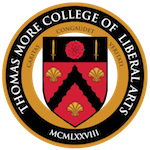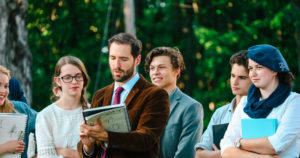 Many great books programs keep you locked in a world of abstract ideas. The program at Thomas More roots those ideas in concrete reality, enabling you to engage the world with your mind, body, and soul. We read the finest works of civilization from Antiquity through the Middle Ages and into the Modern Age. Distinctive elements of Thomas More College’s program include:
Many great books programs keep you locked in a world of abstract ideas. The program at Thomas More roots those ideas in concrete reality, enabling you to engage the world with your mind, body, and soul. We read the finest works of civilization from Antiquity through the Middle Ages and into the Modern Age. Distinctive elements of Thomas More College’s program include:
- No dreary textbooks: You will read the great authors themselves in their original works.
- Experiencing centers of culture: You begin in New England, the birthplace of our country, and then travel to Rome—the living heart of our civilization. Scholarships allow interested students to study British history and literature in Oxford.
- Ideas in Action: The wisdom of the classroom comes alive in extra-curricular activities such as naturalistic drawing, music, woodworking, icon-painting, life-changing internships, and more.
- Creative Focus: Upper-level tutorials enable you and your faculty to partner in the creation of a course of study tailored to your academic interests.
- Catholic: Most importantly, your entire program is joyfully undertaken in a Catholic community, committed to Truth, both natural and revealed.
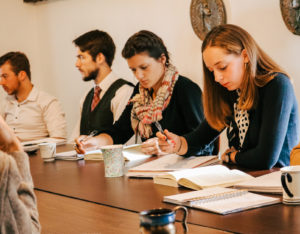
The average person changes careers four times, and less than half of college graduates actually “use” their specific major. Moreover, no single “major” subject will sustain you on your life’s journey. Thomas More College offers you an education that prepares you not only for your first profession, but for your whole career. It is an education that does more than equip you for the workforce—it prepares you for life. Our Liberal Arts program is not an education of limitations, but of immeasurable opportunities.
Thomas More College defends a common education that allows students to study together, discover the beauty and order present in nature and human life, and to crown their studies contemplating the highest things. It is an education that gives you a broad and agile mind and the character capable of navigating the unforeseen—and inevitable—changes of the future. We believe that the “great books” approach that produced leaders over the last 3,000 years is more relevant than ever today. Thomas More College seeks to produce souls prepared for life, not a narrow specialty.
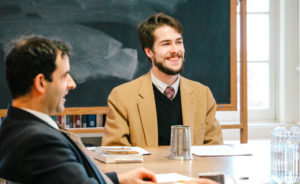 The adventure undertaken at Thomas More College will set your heart free to live life well and bring creativity, beauty, and ordered ideas into the world. A liberal arts education not only forms you, but also prepares you for a broad range of careers. Our graduates have done this through their vocations as teachers, artists, lawyers, computer analysts, financial managers, religious, business executives, parents and in many other worthwhile pursuits. The Catholic great books program at Thomas More College is not a tool for any one career, but a key to unlocking many. We view our education as a success every time a graduate goes forth with the commitment to goodness and truth and the desire to serve God and his fellow man.
The adventure undertaken at Thomas More College will set your heart free to live life well and bring creativity, beauty, and ordered ideas into the world. A liberal arts education not only forms you, but also prepares you for a broad range of careers. Our graduates have done this through their vocations as teachers, artists, lawyers, computer analysts, financial managers, religious, business executives, parents and in many other worthwhile pursuits. The Catholic great books program at Thomas More College is not a tool for any one career, but a key to unlocking many. We view our education as a success every time a graduate goes forth with the commitment to goodness and truth and the desire to serve God and his fellow man.
Studying the most brilliant minds of human history develops the habits of thought and action that allow you to rise above the ordinary in all pursuits.

With a liberal arts education from Thomas More College, you will grow in your ability to think, reason, adapt, and communicate. You will develop an agility of mind, sound leadership qualities, strong character, and an enriched soul. And more importantly, you will be prepared to live a good life in the fullness of Truth. A liberal arts education broadens your outlook so you can think and act freely. It allows you to understand and to pursue a life based on the wisdom of our ancestors. It develops a love of your soul and a sense of wonder over creation. It is an education springing from ancient sources that continuously renews you. A liberal arts education frees you to seek the Truth.
The Program of Studies at Thomas More College is a rigorous training in the liberal arts, humane letters, and the disciplines of philosophy and theology. The entire program is designed to help our students to “put on the mind of Christ” (Philippians 2:5) by forming them in human and divine wisdom and by preparing them for a life of service to the world as eloquent witnesses to the True, the Beautiful, and the Good.
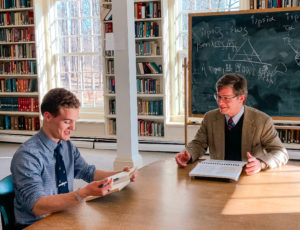 Wisdom, as Cardinal Newman put it, is that “clear, calm, accurate vision, and comprehension of the whole course, the whole work of God.” It is, in other words, the habit of right thinking and judgment that comes from the reasoned-out knowledge of God as first cause and final end of all that exists. Human, or philosophical wisdom is attained after an arduous ascent that begins with the beauty and intelligibility that the senses discover in the world around us and proceeds to what our mind can apprehend of spiritual goods, the soul, and God. The liberal arts, and especially the art of logic, are the necessary equipment for such a course of study, which must be “rigorous,” “coherent,” and “systematic” if it is to result in authentic knowledge (Fides et Ratio 4). For the Christian, human wisdom yields to divine as its completion and judge, as from revelation we receive the principles of Sacred Doctrine, and from the Holy Spirit the gift of infused wisdom which is the inheritance of every confirmed Christian. In conformity with the constant teaching of the Magisterium, the wisdom that theology promises is to be sought first in the reverent, careful reading of Holy Scripture in light of the commentaries of the Fathers and Doctors of the Church and the decrees of Ecumenical Councils and Popes, and afterwards in the discipline of theology proper. And this learning, in order not to be sterile or unreal, must take place within a community of prayer that understands the Sacred Liturgy to be the privileged place of encountering the Truth about man, the universe, and God.
Wisdom, as Cardinal Newman put it, is that “clear, calm, accurate vision, and comprehension of the whole course, the whole work of God.” It is, in other words, the habit of right thinking and judgment that comes from the reasoned-out knowledge of God as first cause and final end of all that exists. Human, or philosophical wisdom is attained after an arduous ascent that begins with the beauty and intelligibility that the senses discover in the world around us and proceeds to what our mind can apprehend of spiritual goods, the soul, and God. The liberal arts, and especially the art of logic, are the necessary equipment for such a course of study, which must be “rigorous,” “coherent,” and “systematic” if it is to result in authentic knowledge (Fides et Ratio 4). For the Christian, human wisdom yields to divine as its completion and judge, as from revelation we receive the principles of Sacred Doctrine, and from the Holy Spirit the gift of infused wisdom which is the inheritance of every confirmed Christian. In conformity with the constant teaching of the Magisterium, the wisdom that theology promises is to be sought first in the reverent, careful reading of Holy Scripture in light of the commentaries of the Fathers and Doctors of the Church and the decrees of Ecumenical Councils and Popes, and afterwards in the discipline of theology proper. And this learning, in order not to be sterile or unreal, must take place within a community of prayer that understands the Sacred Liturgy to be the privileged place of encountering the Truth about man, the universe, and God.
 The search for Truth naturally leads to the desire to rejoice in and testify to theTruth one has attained. Thomas More College embraces the Church’s teaching that a Catholic education should lead its possessors to “try to communicate to society those ethical and religious principles which give full meaning to human life” (Ex corde Ecclesiae 33). By giving her students a true and integral humanistic formation, Thomas More College enables them to contribute to the evangelization of culture. In an age of cultural dislocation, such a formation must include not only reflection upon the principles of the good life, but also a course of study–almost an immersion–in the great works of Classical and Christian culture and in the lives and writings of the saints, so that the student’s imagination and desires may be shaped in accord with what is truly good and beautiful. This humanistic formation is guided by philosophical and theological ethics and employs the tools of the traditional arts of grammar (through the study of one of the great Classical languages), rhetoric, and poetics. Such a formation, culminating in the Tutorials, Junior Project, and Senior Thesis, leads to a kind of eloquence in its possessors, who become ambassadors of the gaudium de veritate, the joy in the truth, that is a Catholic education’s characteristic fruit. Like the great Christian humanists throughout the ages—from St. John Chrysostom and St. Augustine to St. Thomas More and Blessed John Henry Newman—the Thomas More College graduate rejoices to have been given the great task of serving the world by communicating the saving truth of the Incarnate Word.
The search for Truth naturally leads to the desire to rejoice in and testify to theTruth one has attained. Thomas More College embraces the Church’s teaching that a Catholic education should lead its possessors to “try to communicate to society those ethical and religious principles which give full meaning to human life” (Ex corde Ecclesiae 33). By giving her students a true and integral humanistic formation, Thomas More College enables them to contribute to the evangelization of culture. In an age of cultural dislocation, such a formation must include not only reflection upon the principles of the good life, but also a course of study–almost an immersion–in the great works of Classical and Christian culture and in the lives and writings of the saints, so that the student’s imagination and desires may be shaped in accord with what is truly good and beautiful. This humanistic formation is guided by philosophical and theological ethics and employs the tools of the traditional arts of grammar (through the study of one of the great Classical languages), rhetoric, and poetics. Such a formation, culminating in the Tutorials, Junior Project, and Senior Thesis, leads to a kind of eloquence in its possessors, who become ambassadors of the gaudium de veritate, the joy in the truth, that is a Catholic education’s characteristic fruit. Like the great Christian humanists throughout the ages—from St. John Chrysostom and St. Augustine to St. Thomas More and Blessed John Henry Newman—the Thomas More College graduate rejoices to have been given the great task of serving the world by communicating the saving truth of the Incarnate Word.
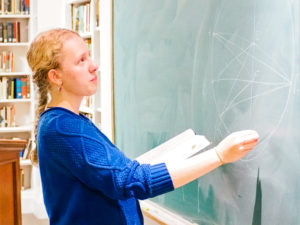
In The Idea of a University, Blessed John Henry Newman coined the phrase “true enlargement of mind” to indicate the excellence at which a liberal education aims, explaining that it is a “power of viewing many things at once as one whole, of referring them severally to their true place in the universal system, of understanding their respective values, and determining their mutual dependence.”
Although he elsewhere refers to such a power as characteristically “philosophical,” it is plainly both the knowledge of architectonic principles and the familiarity with the substance of the various arts and sciences of which a liberal education is composed, including such pursuits as history, literature, rhetoric, mathematics, and the study of the natural world.
To a Catholic, of course, such an education includes—and as its ruling part—a sufficient quotient of Sacred Doctrine to enable the student to join Newman in affirming that faith is “an intellectual act, its object truth, and its result knowledge.”
To the end of specifying a common standard of true enlargement of mind, the President and Fellows declare that the graduates of the College’s program of studies should be able . . .
- To read Latin or Greek at the intermediate level of proficiency.
- To express themselves in clear, cogent, and persuasive spoken and written English.
- To offer a thoughtful and careful analysis of the meaning and structure of an English poem.
- To recognize pattern, harmony, symmetry, and order in works of nature and art.
- To know the difference between knowledge and opinion, and to know when a proposition is held from experience or as the result of argument from prior principles.
- To demonstrate an understanding of the principal themes, figures, literary and artistic works of Western Civilization, to situate them in their historical context, and to see and set them in conversation.
- To give an account of the relationship of the Roman Catholic Church and Western Civilization to the major Eastern cultures and religions.
- To give an account of the way in which nature acts for an end, and to be able to distinguish between the philosophy of nature and modern empirical science.
- To argue from common experience to the nature and immateriality of the human soul.
- To explain what is meant by happiness.
- To explain what is meant by the common good.
- To give an account of the various meanings of the term “wisdom”—speculative and practical, philosophical and theological, acquired and infused.
- To give an account of the way in which theology is a science.
- To demonstrate an understanding of how the whole of the Sacred Scripture tells of the nature, person, and mission of Christ.
- To articulate and defend the mysteries of the faith contained in the Creed.
